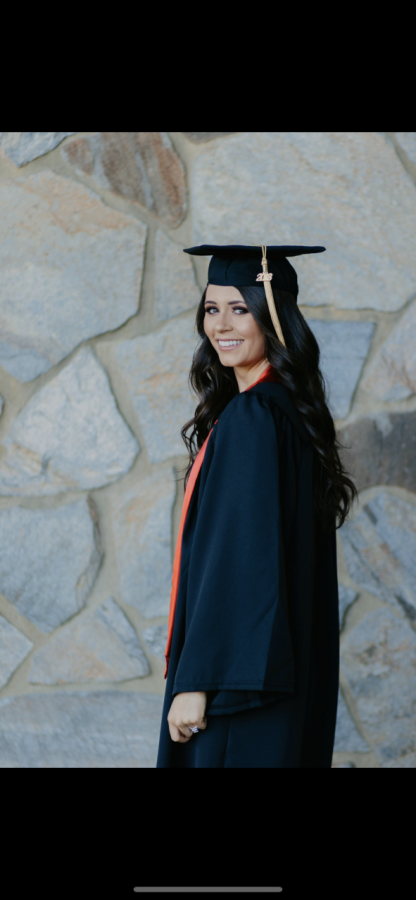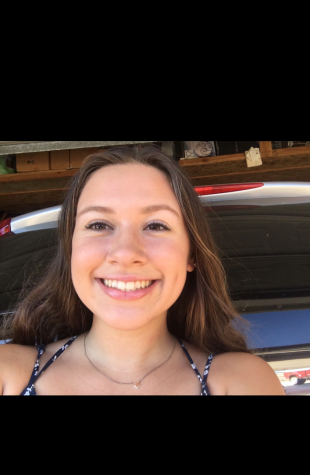Vaccinations Available to Teachers for the Return Back to School
COVID vaccinations were accessible to Tracy High teachers, but were not mandatory for the hopeful return back to school in late March.
Catarina Sisk opted to receive the COVID vaccine prior to returning back to school. This is her second year at Tracy High and looks forward to seeing her students safely.
March 23, 2021
With COVID cases decreasing and the hopeful return back to school in late March, teachers in the Tracy Unified School District had the opportunity to receive the COVID vaccination. The vaccination was not required for teachers to return back to school.
Teachers are eager to see students in person again after enduring remote learning for this prolonged period of time. Students additionally had the choice whether to return back to school or continue with remote learning in their homes.
The process to receive the COVID vaccinations began in early January where teachers were asked to complete a survey on whether they would chose to receive or decline the vaccine. This would allow for the county to have an approximation of the number of doses they would need in order to supply the teachers who wished to receive the vaccine.
Colette Crowley, a teacher in the Social Studies, AVID, and ELD Departments, adds that in early February the San Joaquin County Office of Education (SJCOE) in Stockton, California notified that teachers in the older age groups would receive the vaccine first and then they would allow for the next age group to supersede. Many teachers will be receiving their second dose early to mid-March.
“Teachers were informed by email when their age group was next up for the vaccine. I registered for my appointment, received a QR code via phone and text to verify my identity for the vaccination,” said Crowley.
Crowley also mentioned that the county office was extremely prepared with a quick and well-organized process for handling the vaccinations for thousands of school staff members.
“As reported by Dr. Stephens, some in our county chose not to get vaccinated, but the overwhelming majority of teachers chose to receive the COVID 19 vaccination,” said Crowley.
Erin McKay, a teacher in the Science department, gave insight on the vaccine as well as COVID in general. McKay provided background on the traditional approach of what the clinical process for vaccines entail with a cartoon of CDC/FDA emergency usage from NPR.
In total there are four phases. Phase 1 has a length of one month with 10-20 people and focuses on if its safe, how does the body process it, and side effects. Phase 2 lasts 3-12 months with 50-75 people and focuses on if it is safe, how well does it work, and how much should be taken. Phase 3 lasts 6-12 months and focuses on if its safe, how well is it working and and if the benefits outweigh the risk. Phase 4 lasts 3-12 months and focuses on if it still remains to appear safe, and if there are side effects, and the cost effectiveness in comparison to similar drugs.
McKay adds that there is usually a dispersal of interest and resources for different clinical trials, but for COVID money and paperwork was lined up fairly quickly in order to create the vaccine effectively and efficiently. Many of our resources world wide went into developing this vaccine as fast as possible.
Catarina Sisk, who was new to Tracy High last year as a teacher in the Social Science department, had her year cut short due to the COVID virus. Sisk says she feels a lot more comfortable returning back to school now that she has the COVID vaccine.
Sisk added that what she misses most about being in school is an easy question to answer. “I miss the students. I miss actually getting to know my students as it is hard to make connections with them when I cannot see them. I became an educator to connect with students and make my classroom a safe and happy place to be,” said Sisk.
Sisk said keeping 160+ students engaged will be challenging as every student is different, but it will be a goal she strives for each day.
Similarly DeEtte Burton, a teacher in the English department, said that teachers are still at school but they miss student’s faces and voices.
“The hallways are quiet (except for Fridays in the A building). Students in our classrooms energize us and energize learning, even if they don’t realize it. I miss the energy!” said Burton.
Burton plans on keeping students engaged when returning back to school with more interaction with students, making the classroom inviting, and to end the year on a positive note for her seniors.
In addition Burton said, “Ultimately, the return to the classroom influenced my decision the most, so, yes, I do feel better about it in some ways. However, since there are still many unknowns, like if I can still carry COVID to others or if I can still get COVID but perhaps a lesser version of it, I still have concerns.”
Rob Allee, a Government/Econ teacher, chose not to receive the vaccine. “I did not get the vaccination but I feel good about students coming back to school,” said Allee.
Allee is most excited about getting back to some normalcy and interacting with students in person. He also added that was he misses most about school is the students and school activities. Allee said, “I think just getting back into the swing of things ( going back to class, seeing friends, etc.) will be motivating for students.”
Furthermore, Colette Crowley said, “I can’t wait to meet my students in person. School is so much more than just academics. Schools help develop the whole student- a well-rounded student through friends, sports, activities, clubs, community connectedness, etc.”
Crowley adds she will do her best to keep her students engaged.
“I think one of the biggest things a teacher can do is to let their students know that you are on their side, that you are in their corner. I will work to support my students in any way I can to help them succeed,” said Crowley.
School goes back in session March 29, 2021 for ninth through twelfth grade. There is two cohorts: green and gold. A-L is the green cohort and M-Z is the gold cohort. Students had the option to stay fully online (distance learning) or to go to school two days a week with the rest of the days online(hybrid). The green cohort attends Mondays and Thursdays while the gold cohort attends Tuesdays and Fridays if they chose the hybrid option.


